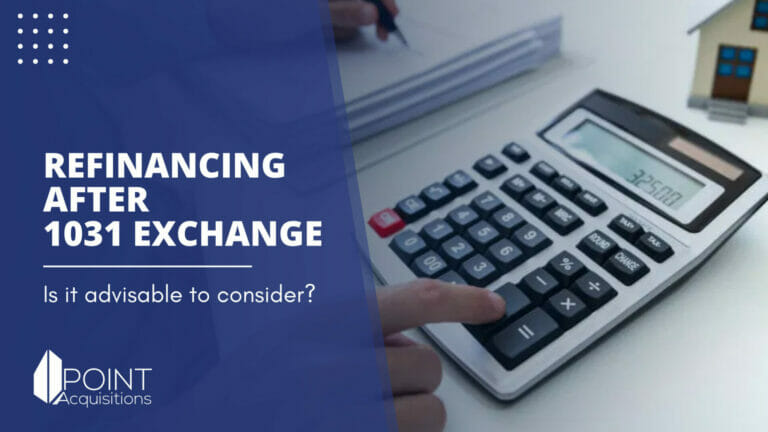
Should I refinance after a 1031 exchange?
Refinancing presents a compelling avenue for unlocking potential value and enhancing your property portfolio after successfully executing a 1031 exchange.
In this article, we will delve into the intricacies of refinancing and address key questions that arise in the minds of astute investors like yourself. From exploring the benefits and considerations of refinancing to understanding its potential tax implications, we’ll provide you with invaluable insights to make informed decisions and drive optimal returns.
Whether you’re a seasoned investor seeking to optimize your cash flow or a first-time commercial property owner navigating the world of 1031 exchanges, this guide will equip you with the knowledge and strategies needed to make the most of your investment endeavors.
As we embark on this journey, remember that each financial decision comes with its own set of considerations. It is always advisable to consult with professionals such as Point Acquisitions. Our team can guide you in the right direction and connect you with experts who specialize in 1031 exchanges and can provide the guidance and support you need to make informed decisions.
Now, let’s dive into the world of refinancing after a 1031 exchange and explore the avenues that can elevate your investment game to new heights.

Table of Contents
What is a 1031 exchange?
A 1031 exchange, also known as a like-kind exchange, is a powerful tax-deferral strategy utilized by commercial real estate investors to defer capital gains taxes when selling one investment property and acquiring another similar property. Under Section 1031 of the Internal Revenue Code, taxpayers can defer paying capital gains taxes on the sale of an investment property if the proceeds are reinvested into another property of equal or greater value.
The term “like-kind” refers to the requirement that the relinquished property and the replacement property must be of the same nature or character, regardless of differences in location, quality, or other specific attributes. This means that investors can exchange a wide range of real estate assets, such as commercial buildings, rental properties, vacant land, or even certain types of personal property, as long as they meet the like-kind criteria.
How does a 1031 exchange work?
The process of a 1031 exchange involves several key steps. First, the property owner, also known as the exchanger, must identify a suitable replacement property within 45 days from the date of selling the relinquished property. It is important to note that the identification must be made in writing and submitted to a qualified intermediary, who plays a crucial role in facilitating the exchange.
Next, the exchanger has a total of 180 days from the sale of the relinquished property to complete the acquisition of the replacement property. During this period, it is crucial to adhere to strict timelines and comply with the rules set forth by the Internal Revenue Service (IRS).
To ensure a successful 1031 exchange, the exchanger must work with a qualified intermediary who will hold the proceeds from the sale of the relinquished property and facilitate the acquisition of the replacement property. The intermediary serves as a neutral third party and helps navigate the complex tax regulations associated with the exchange.
By utilizing a 1031 exchange, investors can defer paying capital gains taxes that would otherwise be due upon the sale of their investment property. This tax deferral allows them to preserve more capital for reinvestment and potentially grow their real estate portfolio more rapidly.
It’s important to consult with tax professionals and experienced advisors who specialize in 1031 exchanges to ensure compliance with IRS regulations and maximize the benefits of this tax-deferral strategy. Each transaction is unique, and professional guidance is essential to navigate the complexities and nuances of the process.

Can I refinance a property after completing a 1031 exchange?
Yes, it is possible to refinance after a 1031 exchange completion. A 1031 exchange does not restrict you from refinancing the acquired property. Refinancing offers an opportunity to access additional funds or adjust the terms of your existing mortgage to better align with your investment goals.
Refinancing a property after a 1031 exchange follows a similar process to refinancing any other property. You can explore options with lenders to secure a new mortgage or adjust the terms of your existing loan. The availability of refinancing options will depend on various factors, including your financial situation, creditworthiness, and current lending market conditions.
Is it possible to get a mortgage loan after a 1031 exchange?
Yes, it is possible to obtain a mortgage loan after completing a 1031 exchange. A 1031 exchange does not preclude you from securing a mortgage on the property you acquired through the exchange.
Getting a mortgage loan after a 1031 exchange follows a similar process to obtaining financing for any other investment property. Lenders will evaluate various factors, such as your credit history, income, property value, and debt-to-income ratio, to assess your eligibility for a loan. The terms and conditions of the mortgage loan will depend on your specific financial circumstances and the lending institution’s policies.
It’s important to note that lenders may have their own guidelines and requirements when it comes to providing loans for properties acquired through a 1031 exchange. It is advisable to work with lenders who are familiar with 1031 exchanges and commercial real estate transactions to ensure a smooth financing process.
Additionally, maintaining proper documentation of the 1031 exchange and any subsequent transactions is crucial. This documentation can help lenders understand the ownership history of the property and ensure compliance with IRS regulations.
What are the benefits of refinancing after a 1031 exchange?
Refinancing after a 1031 exchange can offer several benefits to commercial real estate investors. Some of the key advantages include:
Access to Equity:
Refinancing allows you to tap into the accumulated equity of the property acquired through a 1031 exchange. By refinancing, you can access additional funds that can be reinvested in other properties, used for property improvements, or allocated for other investment opportunities.
Improved Cash Flow:
Refinancing can potentially lower your monthly mortgage payments by securing a new loan with more favorable terms, such as a lower interest rate or extended repayment period. This can result in increased cash flow and improved profitability for your investment property.
Debt Restructuring:
Refinancing provides an opportunity to restructure your existing debt. You can adjust the loan terms, convert from an adjustable-rate mortgage to a fixed-rate mortgage, or consolidate multiple loans into a single mortgage, thereby simplifying your financial obligations and potentially reducing overall interest expenses.
Enhanced Property Value:
Through refinancing, you can leverage additional funds to make property improvements or undertake renovations, which can increase the value of the property. The improved property value can result in higher rental income or potential appreciation upon eventual sale.
Capitalizing on Lower Interest Rates:
If interest rates have decreased since your initial financing, refinancing allows you to secure a new loan at the lower rates, potentially reducing your borrowing costs and improving your property’s financial performance.

Are there any drawbacks to refinancing after a 1031 exchange?
While refinancing after a 1031 exchange can provide numerous benefits, it is crucial to consider potential drawbacks before making a decision. Some of the drawbacks include:
Costs and Fees:
Refinancing typically involves closing costs, appraisal fees, and other transaction expenses. These costs can erode the potential financial benefits of refinancing, especially if you plan to sell the property in the near future.
Extended Loan Term:
If you choose to refinance with a new loan that has an extended repayment term, you may end up paying more in interest over the long run, even if you achieve short-term cash flow improvements. It’s important to carefully consider the trade-off between immediate benefits and long-term financial implications.
Impact on Tax Considerations:
Refinancing can have potential tax implications. It is essential to consult with tax advisors to understand how refinancing may affect your tax obligations, deductions, and any potential recapture of depreciation.
Market Conditions:
Refinancing decisions should consider prevailing interest rates, market trends, and economic conditions. If interest rates are anticipated to rise significantly, refinancing may not be as advantageous as it would be in a low-rate environment.
How long should I wait before refinancing after a 1031 exchange?
The ideal timing for refinancing after a 1031 exchange can vary based on several factors, including your investment objectives, market conditions, and specific property circumstances. While there is no set waiting period mandated by the IRS, it is crucial to consider the following aspects:
Stabilization Period:
It is generally recommended to wait until the acquired property has stabilized before considering refinancing. Stabilization refers to reaching a point where the property has achieved its optimal occupancy level, rental income is consistent, and any necessary renovations or improvements have been completed.
Prepayment Penalties:
Review the terms of your existing loan to determine if there are any prepayment penalties associated with refinancing. Some loans impose penalties if the loan is paid off within a specified timeframe. Taking prepayment penalties into account can help you determine the most advantageous timing for refinancing.
Market and Interest Rate Analysis:
Monitor market conditions and interest rate trends to assess potential refinancing opportunities. If interest rates have significantly decreased since your initial financing, it may be advantageous to refinance sooner rather than later.
Financial Goals:
Consider your investment goals and financial objectives. If refinancing aligns with your long-term strategy and can provide tangible benefits, such as improved cash flow or access to equity for future investments, it may be appropriate to pursue refinancing at an opportune time.

Can I refinance a property multiple times after a 1031 exchange?
Yes, it is possible to refinance a property multiple times after completing a 1031 exchange. There are no restrictions on the number of times you can refinance a property acquired through a 1031 exchange, as long as you meet the eligibility criteria set by lenders and comply with applicable lending guidelines.
Each refinance is evaluated based on factors such as your financial profile, creditworthiness, property value, and market conditions at the time of refinancing. It is important to note that each refinancing transaction will incur associated costs and fees, including appraisal fees, closing costs, and potentially prepayment penalties, depending on the terms of your existing loan.
Refinancing multiple times can provide you with opportunities to optimize your investment strategy, access additional funds, adjust loan terms, or take advantage of more favorable interest rates. However, it is crucial to carefully assess the costs, benefits, and potential long-term implications of each refinancing decision.
About The Author

Jesse Shemesh
Disclaimer
Please note that Point Acquisitions is not a tax expert or tax advisor. The information on our blogs and pages is for general informational purposes only and should not be relied upon as legal, tax, or accounting advice. Any information provided does not constitute professional advice or create an attorney-client or any other professional relationship. We recommend that you consult with your tax advisor or seek professional advice before making any decisions based on the information provided on our blogs and pages. Point Acquisitions is not responsible for any actions taken based on the information provided on our blogs and pages.
1031 Exchange Capital Gains Tax Deferral
According to a 2021 report by the National Real Estate Exchange Services (RES), over 240,000 1031 exchange transactions were completed in the United States, totaling $100 billion. This impressive figure underscores the role of 1031 exchanges in the real estate…
Read More1031 Exchange Benefits
As of Q4 2023, the national vacancy rate for all commercial property types in the United States sat at 9.2%, according to CBRE’s latest insights and research. This represents a slight decrease compared to the previous quarter and suggests a…
Read More1031 Exchange Legal Considerations: A Must-Read Guide
You’re in the right place if you’re considering a 1031 exchange for your commercial real estate investments. Whether you’re a seasoned investor or just dipping your toes into the market, understanding the legal landscape of 1031 exchanges is key to…
Read More

